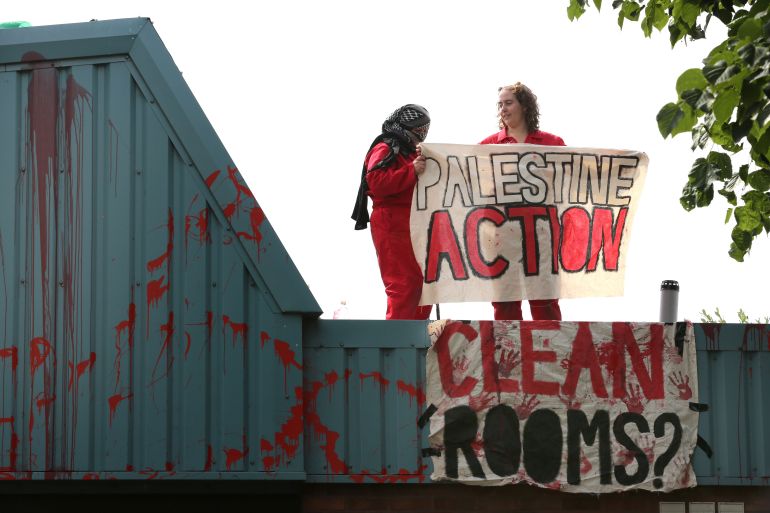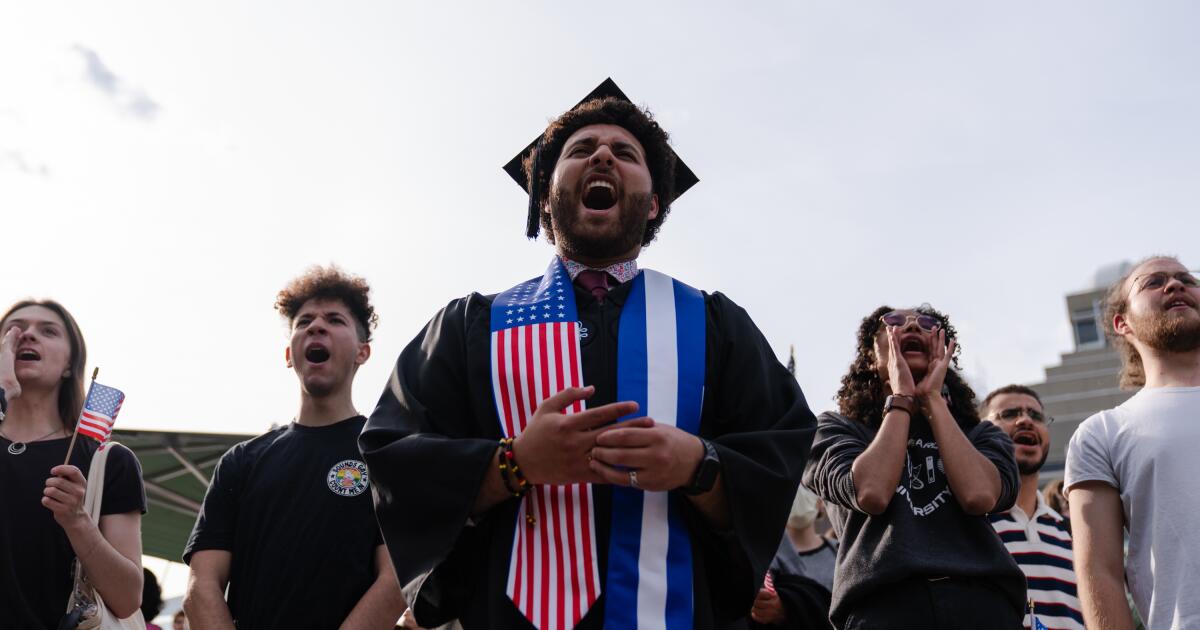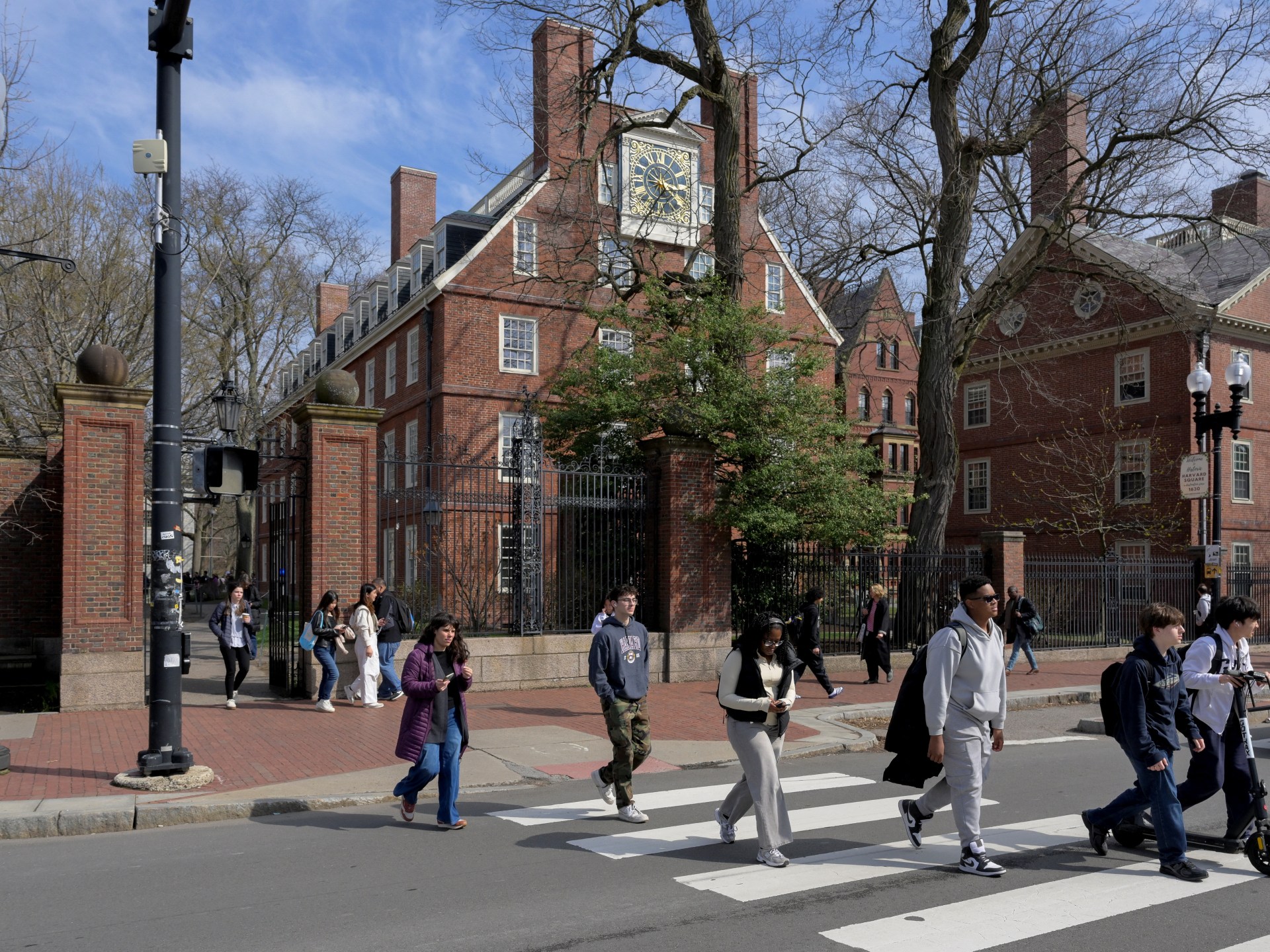Palestine Action: What has the group done, as it faces a ban? | Censorship News
EXPLAINER
MPs in the UK have voted to proscribe the group as a terrorist organisation, but what has it actually done?
Members of Parliament in the United Kingdom voted overwhelmingly this week to proscribe the campaign group, Palestine Action, as a terrorist organisation under anti-terrorism laws, putting the group on a par with armed groups such as al-Qaeda and ISIL (ISIS).
A draft order to amend the Terrorism Act 2000 to do this, brought by Home Secretary Yvette Cooper, passed through the House of Commons on Wednesday by 385 votes to 26.
Cooper tabled the order in parliament just days after Palestine Action activists broke into RAF Brize Norton, the largest station of the Royal Air Force in Oxfordshire, and sprayed two military planes with red paint, resulting in millions of pounds of criminal damage, according to police.
On Friday, the High Court in London is hearing a challenge to the order. Palestine Action co-founder Huda Ammori has asked for a temporary block on the legislation.
Prime Minister Keir Starmer condemned the Airbus Voyager incident in an X post, saying: “The act of vandalism committed at RAF Brize Norton is disgraceful.”
Palestine Action describes itself as “a pro-Palestinian organisation which disrupts the arms industry in the United Kingdom with direct action”. It says it is “committed to ending global participation in Israel’s genocidal and apartheid regime”.
The government claims it is a “terrorist” outfit.
But what has the group actually done?
What happened at Brize Norton?
In the highest-profile move made by the group so far, activists sprayed red paint into the turbine engines of two Airbus Voyager aircraft, used for air-to-air refuelling.
According to Manaal Siddiqui, a spokesperson for Palestine Action, “These [Royal Air Force] aircraft can be used to refuel and have been used to refuel Israeli fighter jets.” He added that planes from Brize Norton fly to the British air force base in Cyprus, from where they are “dispatched on spy missions and that intelligence is shared with the Israeli government and the Israeli air forces”.
What else has the group done?
Since its founding in July 2020, Palestine Action (PA) has carried out hundreds of protests across the UK aimed at disrupting the operations of companies they accuse of profiting from Israeli military operations, with a particular focus on the Israeli arms manufacturer, Elbit Systems.
Palestine Action members’ tactics typically involve breaking into facilities, chaining themselves to machinery, daubing buildings with red paint and destroying equipment.

They include the following incidents:
- The group launched a series of break-ins at Elbit’s Ferranti site in Oldham, near Manchester in northern England. Between 2020 and early 2022, the site was repeatedly occupied and vandalised, culminating in Elbit closing the facility in January 2022 – an outcome Palestine Action declared as a major victory.
- In 2021, the group occupied the Leicester drone factory operated by UAV Tactical Systems, a subsidiary of Elbit. Activists chained themselves to the roof for nearly a week. Ten people were arrested, but later acquitted.
- Throughout 2022, PA’s actions became more frequent. In April, they blockaded another Elbit site in Braunstone, Leicestershire. In June, they broke into the Thales UK factory in Glasgow and caused more than 1 million pounds ($1.37m) of damage with smoke bombs and property destruction. Five activists were jailed.
- Following the launch of Israel’s war on Gaza in October 2023, Palestine Action intensified its efforts. They targeted the BBC’s headquarters in London with red paint to protest against the broadcaster’s perceived pro-Israel bias, and blockaded facilities of arms manufacturers including Lockheed Martin, the US aerospace and defence group which has a base in London, and Leonardo, the defence and security group.
- Palestine Action has also expanded internationally. In November 2023, its newly launched US branch occupied the roof of an Elbit facility in Merrimack, New Hampshire, with three activists arrested and later released with misdemeanour charges.
- In August 2024, activists drove a van into Elbit’s headquarters in Bristol, stormed the building and caused extensive damage. At about the same time, they spray-painted the Ministry of Defence, in central London, red and defaced a statue of Arthur Balfour with tomato ketchup inside the House of Commons. Balfour was a former Conservative prime minister who, as serving foreign secretary in 1917, authored the Balfour Declaration which supported the establishment of a Jewish Homeland in Palestine.
- In June 2025, the group carried out one of its most provocative actions to date: infiltrating RAF Brize Norton, the UK’s largest airbase. Activists used electric scooters to breach security and vandalised military aircraft with red paint.
What does Palestine Action say about being banned?
In a statement posted on its X profile, Palestine Action said: “The real crime here is not red paint being sprayed on these warplanes, but the war crimes that have been enabled with those planes because of the UK government’s complicity in Israel’s genocide.”
The group added that the government’s move could risk criminalising legitimate protest.
The statement also accused Starmer of “hypocrisy” since the prime minister, back in 2003, supported protesters who broke into an RAF base to stop US bombers heading to Iraq. At the time, Starmer was a lawyer.
“I think it’s a very knee-jerk reaction from an embarrassed government, and it’s an overblown reaction,” Siddiqui said.
Siddiqui said it was unprecedented for Palestine Action to be proscribed as a terrorist organisation. “The majority of the proscribed groups are international. The majority of them take actions in very, very different ways. Palestine Action would be a complete outlier. It’s a draconian approach for the government to stifle protests that they just don’t like. It’s genuinely terrifying for anyone who cares about civil liberties in the UK.”
In all, 81 groups are proscribed in the UK under the Terrorism Act 2000. They include political movements with armed wings such as Hamas and Hezbollah, as well as armed groups like ISIS (ISIL), al-Qaeda and Tehreek-e Taliban Pakistan.



